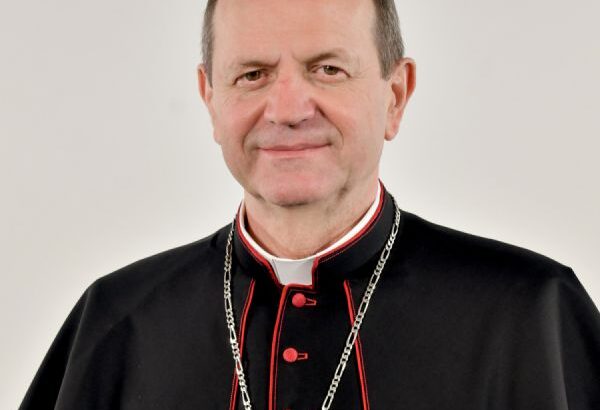Oliver Hinz (KNA)
Archbishop Tadeusz Wojda (67) of Gdansk is the new President of the Polish Bishops’ Conference. At their plenary meeting in Warsaw on Thursday, the 90 or so bishops with voting rights elected Wojda as the successor to Archbishop Stanislaw Gadecki (74), according to a spokesperson. According to the statutes, the previous chairman had to step down after two five-year terms.
Wojda, born on 29 January 1957 near the city of Kielce in south-eastern Poland, is a member of the Pallottine Order. Before becoming Archbishop of the Baltic city of Gdansk in 2021, he was Archbishop of Bialystok in north-east Poland for almost four years. The doctor of missionary studies became known above all for his vehement commitment to traditional family values. In the church in Poland, he is categorised as neither progressive nor conservative.
The new chairman of the bishops’ conference was ordained a priest in 1983. In 1984, he went to Rome for further studies, which he completed in 1989 with a doctoral thesis on missionary theology from Münster and the Belgian University of Leuven. Wojda knows his way around the Vatican well because he worked for its evangelisation office for a long time. Pope Benedict XVI (2005-2013) appointed him Under-Secretary of State of the Congregation for Missions in 2012.
The Bishops’ Conference elected the Archbishop of Wroclaw, Jozef Kupny (68), as the new Vice-Chairman. Archbishop Marek Jedraszewski (74) of Krakow stepped down from this position by rotation after two terms in office.
Gadecki had headed the Bishops’ Conference for ten years and had previously been its Vice-Chairman since 2004. Among his most difficult official acts in front of the bishops on Wednesday were his letter to Patriarch Cyril I following Russia’s attack on Ukraine in February 2022 and the “Letter of Fraternal Concern” of 2022 to the Chairman of the German Bishops’ Conference, Bishop Georg Bätzing, regarding the Synodal Path reform project. Gadecki protested at the time that some of the German body’s resolutions contradicted the Gospel.
Gadecki described the “most joyful events” during his time in office as firstly the acceptance of Ukrainian refugees in Poland and the aid for the neighbouring country attacked by Russia; then the “ban on eugenic euthanasia”. By this he means the decision of the Polish Constitutional Court in October 2020, which declared the passage in the abortion law that permitted abortions in the event of a serious foetal malformation or disease to be unconstitutional. In his own words, he was also pleased by the celebration of the 1,050th anniversary of Poland’s baptism and the introduction of the “Day of Judaism”.
The Roman Catholic Church has traditionally had great influence in Poland. In recent years, however, it has lost prestige, especially among the younger generation. In the most recent census in 2021, around a fifth fewer respondents declared their allegiance to the Roman Catholic Church than in the 2011 census. Only 27.1 million Poles said they were Catholic, compared to 33.7 million in 2011.



